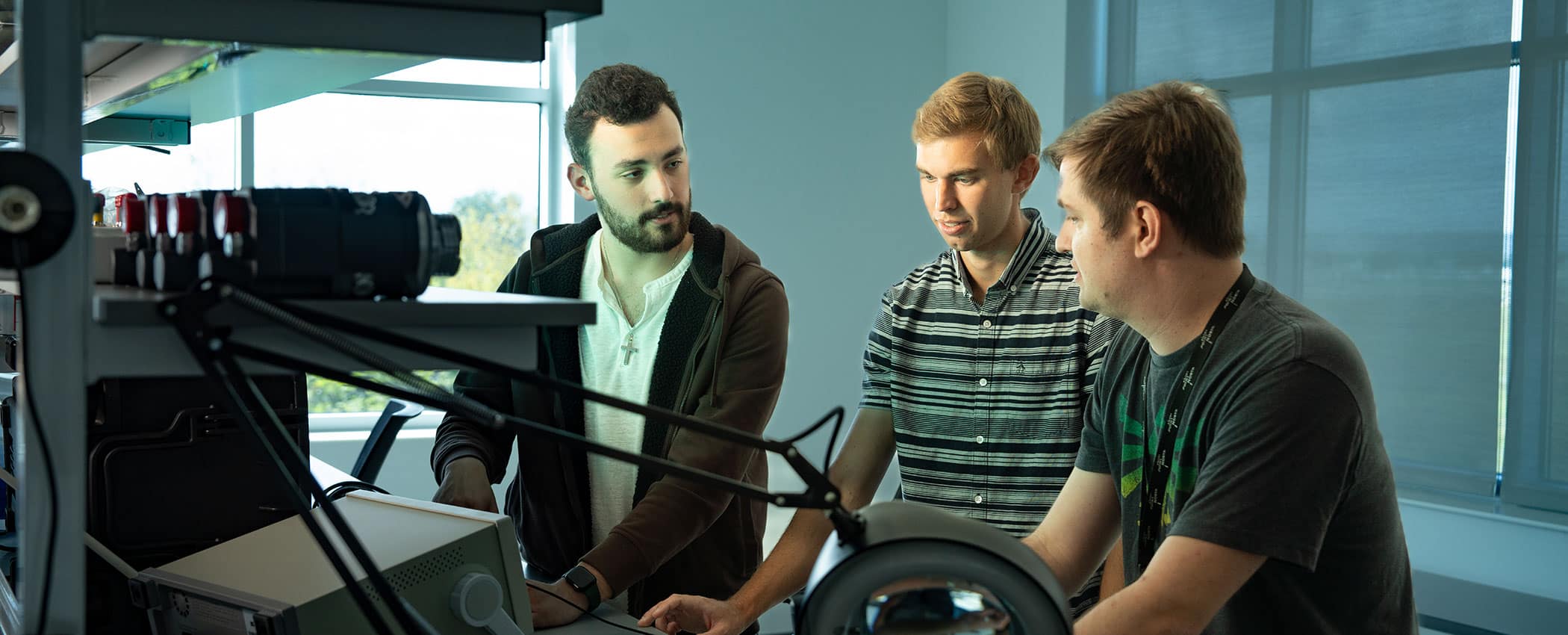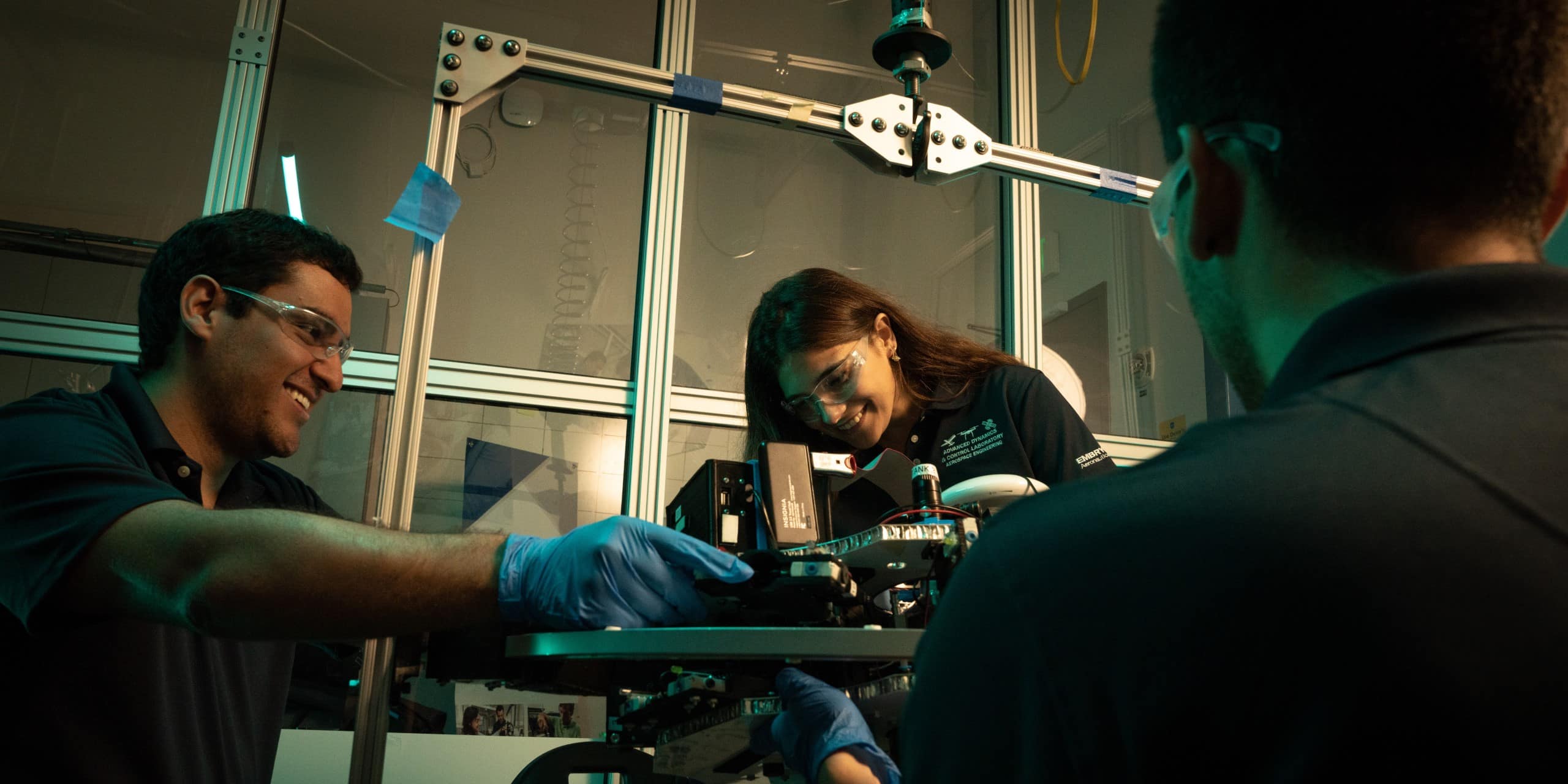
Master of Science in
Systems Engineering
The Master of Science in Systems Engineering focuses on fundamental systems engineering and shows how a systems perspective applies to business and technology.
About the Master of Science in Systems Engineering
Systems engineers are in demand for their technical expertise and engineering management skills, and a Master of Science in Systems Engineering prepares graduates for the roles needed in the industry.
With world-renowned faculty and a curriculum that focuses on a solid understanding of fundamental systems engineering, Embry‑Riddle develops engineers and managers to formulate solutions to complex, real-world engineering problems. Offering both technical and engineering management tracks, Embry‑Riddle allows you to focus your education on the elements most important to you.
Student Learning Outcomes
What you will learn while pursuing a Systems Engineering degree:
- Process: ability to apply systems engineering processes to the life-cycle development and management of systems (products and services) considering engineering, technology, environmental, organizational and economic risk and factors
- Technology: ability to apply systems engineering methods, techniques and tools as they relate to the stages of the system design process, starting with the concept and requirements development and ending with system testing and evaluation
- Management: ability to apply systems engineering management methods, techniques and tools as they relate to the system development, operation and disposal processes
- Communication: ability to communicate effectively and to perform successfully as an individual and as part of a team
Systems Engineering Career Opportunities
Careers and Employers
The Embry-Riddle systems engineering graduate program boasts a high 100% placement rate within one year of graduation. Many graduates from the online master's degree transition into positions such as
- Division Managers
- Logistics Engineers
- Project Managers
- Systems Analysts
- System Designers
- Software Engineers
Systems Engineering graduates tend to enter the industry with companies such as:
- Amazon
- Boeing
- Raytheon Technology
- Lockheed Martin
- Collins Aerospace
- Microsoft
- L3Harris Technologies
Systems Engineering Salary Information
As of 2023, alumni with a degree in engineering management tend to receive competitive salaries, with an average income of $121,700 annually, in the first year after graduation.
DETAILS
This offering is available at the following campuses. Select a campus to learn more.
About Systems Engineering at the Daytona Beach, FL Campus
Systems Engineering looks at the big picture to understand the entire process, and then works to achieve systems integration in order to connect the needs of the customer to the designs of the components.
Housed in the Electrical Engineering and Computer Science Department within the College of Engineering, a degree focused on complex systems and engineering management provides the foundations of the systems engineering processes to develop and implement solutions as they apply to the aviation, aerospace and transportation industries.
Tracks/Specialties and/or Certificates
Students can customize their Systems Engineering degree by choosing from these available tracks:
- Engineering Management Track: 12 credits
- Technical Track: 12 credits
Systems Engineering Information
- Credits: 30
- Online or In-Person: In-Person
- Thesis: Thesis or Non-Thesis Option
Helpful Links
- Tour our Daytona Beach Campus
- Discover the Department's Faculty
- Explore the Fields of Study: Engineering & Computer & Technology
- Find Related Clubs & Organizations
Student Learning Outcomes
Students will:
- Apply systems engineering processes to the life-cycle development and management of systems (products and services) considering engineering, technology, environmental, organizational, and economic risk and factors.
- Apply systems engineering methods, techniques, and tools as they relate to the stages of the system design process.
- Apply systems engineering management methods, techniques, and tools as they relate to the system development, operation, and disposal processes.
- Communicate effectively and perform successfully as an individual and as part of a team.
Degree Requirements
Both thesis and non-thesis option require the completion of 30 credits with a common core of 12 credits program core.
Thesis Option
| Core Requirements | ||
| SYS 500 | Fundamentals of Systems Engineering | 3 |
| SYS 530 | System Requirements Analysis and Modeling | 3 |
| SYS 560 | Introduction to Systems Engineering Management | 3 |
| SYS 625 | System Quality Assurance | 3 |
| SYS 700 | Graduate Thesis | 9 |
| Program Electives | 9 | |
Electives will be chosen from existing Daytona Beach campus courses offered in the College of Engineering and/or the College of Business, and must be approved by the student’s advisor or program coordinator. | ||
| Total Credits | 30 | |
Non-Thesis Option - Technical Track
| SYS 500 | Fundamentals of Systems Engineering | 3 |
| SYS 530 | System Requirements Analysis and Modeling | 3 |
| SYS 560 | Introduction to Systems Engineering Management | 3 |
| SYS 610 | System Architecture Design and Modeling | 3 |
| SYS 625 | System Quality Assurance | 3 |
| SYS 690 | Systems Engineering Project | 3 |
| Technical Track Electives | 12 | |
Electives will be chosen from existing Daytona Beach campus courses offered in the College of Engineering and/or the College of Business, and must be approved by the student’s advisor or program coordinator. | ||
| Total Credits | 30 | |
Non-Thesis Option - Engineering Management Track
| SYS 500 | Fundamentals of Systems Engineering | 3 |
| SYS 530 | System Requirements Analysis and Modeling | 3 |
| SYS 560 | Introduction to Systems Engineering Management | 3 |
| SYS 625 | System Quality Assurance | 3 |
| SYS 660 | Organizational Systems Management | 3 |
| SYS 690 | Systems Engineering Project | 3 |
| Engineering Management Track Electives | 12 | |
Electives will be chosen from existing Daytona Beach campus courses offered in the College of Engineering and/or the College of Business, and must be approved by the student’s advisor or program coordinator. | ||
| Total Credits | 30 | |
Get Started Now:
Summary
30 Credits
Estimate your tuition by using the Tuition Calculator
View Financial Aid Information
Learn about our General Education
Find out about transferring credits to this degree
Learn more about our Veterans & Military benefits
View our Academic Calendar

Spotlight
About Systems Engineering at the Worldwide & Online Campus
The Master of Science in Systems Engineering is designed for students who have gained knowledge and experience in a technical discipline, including systems engineering and are looking to broaden their perspective and toolkit. Both traditional students and professionals enter the program with varying levels of experience to understand and apply systems thinking principles and systems engineering tools to different types of complex systems.
Students are immersed in project management, encouraged to incorporate their personal and professional experiences into their coursework, actively engage in teamwork and are prepared to immediately apply new skills on the job.
Tracks/Specialties and/or Certificates
The systems engineering program offers master's students two tracks:
- Technical Track: builds on engineering, technical or physical sciences to enhance systems thinking
- Engineering Management Track: combines the technical aspects of the field with business-oriented coursework for management roles
Systems Engineering Information
- Credits: 30
- Online or In-Person: Fully Online
- Capstone: Capstone Project
Helpful Links
- Attend a Worldwide Virtual Info Session
- Discover the Department's Faculty
- Explore the Fields of Study: Computers & Technology & Engineering
- Find Related Clubs & Organizations
Courses
SYSE 500 Fundamentals of Systems Engineering 3 Credits (3,0)
An introduction to the fundamental principles, processes, and practices associated with the application of Systems Engineering across the system life cycle. Translate needs and priorities into system requirements; derive requirements. Methods and standards; concept definition; interface definition; requirements development and management; system baseline definition and management; system architecture development; integrated schedule management and analysis; risk assessment; systems integration, verification, and validation. Mathematical and graphical tools for system analysis and control, testing and evaluation of system and technology alternatives. Reliability and maintainability, design trade-offs and trade off models.
SYSE 505 System Safety and Certification 3 Credits (3,0)
Concepts, principles, methods and process applied for development of safety-critical and mission-critical software-intensive systems. The issues of system safety, requiring additional analysis and design techniques, are discussed from the perspective of computer hardware and software. The course discusses the safety requirements, hazard and risk analysis, failure modes and effect analysis, fault tolerance, basics of hardware and software reliability, levels of integrity, nature of faults and redundancy, and issues of verification, validation and certification. Safety standards across application domains, including SAE, ARP4754 & ARP4761 and RTCA DO-178C & DO-254 for safety considerations in development of aircraft systems are analyzed. The related certification roles, process, objectives, and activities are discussed. Selected software tools supporting safety and reliability assessment of hardware laboratory experiments with tools, and producing appropriate reports.
SYSE 515 Mathematical Applications in Systems Engineering 3 Credits (3,0)
Applied and context-driven approach to understanding key topics from the calculus, economics and probability and statistics series for engineers. An introduction to fundamental topics in economics, probability and statistics and calculus in the context of systems engineering; analytical skills for system planning, design, and analysis.
SYSE 530 System Requirements Analysis and Modeling 3 Credits (3,0)
The development, definition, and management of requirements for system or product. The system requirements process; requirements elicitation techniques; alternative requirements analysis techniques; requirements specification; requirements verification and validation; requirements management, and requirements standards and tools. Stakeholder identification, risk analysis, trade off analysis as it relates to the requirements.
SYSE 560 Introduction to Systems Engineering Management 3 Credits (3,0)
Fundamental principles of engineering management in the context of systems engineering. Effective technical planning, scheduling, and assessment of technical progress. Techniques for life cycle costing; performance measurement; modern methods of effective engineering management; quality tools; quality management; configuration management; concurrent engineering; risk management; functional analysis; conceptual and detail design assessment; test evaluation. Systems engineering planning and organization; communication and SE management tools and techniques. Development of a Systems Engineering Management Plan, Integrated Master Schedule and/or Integrated Master Plan.
SYSE 610 System Architecture Design and Modeling 3 Credits (3,0)
Concepts and techniques for architecting systems and the process of developing and evaluating architectures. Generating functional, physical, and operational architecture. Modeling and analysis approaches; generation of analyzable architecture models; interface design; architecture frameworks; enterprise engineering; design for reliability, maintainability, usability, supportability, producibility, disposability, and life cycle costs; validation and verification of systems architecture; the analysis of complexity; methods of decomposition and re-integration; trade-offs between optimality and reusability; the effective application of COTS; and practical heuristics for developing good architectures.
SYSE 625 System Quality Assurance 3 Credits (3,0)
Principles and techniques of planning, organizing, controlling, and improving the quality, safety, reliability, and supportability of a system throughout the system life cycle. Establishing a baseline control; cognitive systems engineering and the human-systems integration in complex systems environments. Methods of developing fitness for use; quality costs; quality planning; statistical analysis and control; experimental design for quality improvement; System Reliability, Maintainability, and Availability; applied quality programs such as ISO 9001:2000, ISO 14001, CMMI.
SYSE 650 Digital Engineering with Artificial Intelligence and Machine Learning 3 Credits (3,0)
Explore the principles and applications of Digital Engineering (DE), focusing on how Artificial Intelligence (AI) and Machine Learning (ML) enhance modern engineering practices. In-depth understanding of Model-Based Systems Engineering (MBSE), digital twins, digital threads, and system lifecycle management; leveraging industry-standard tools such as Genesis Vitech, and MATLAB. AI and ML-driven analytics optimize system design, performance, and decision-making.
SYSE 660 Organizational Systems Management 3 Credits (3,0)
Concepts of organizational management and leadership from a systems and complex systems perspective. Strategic management; organizational transformation; organizational environments. Modeling of marketing, finance, organizational behavior, and strategic and operational management.
SYSE 697 Systems Engineering Project 3 Credits (3,0)
A project in systems engineering as a conclusion of the academic coursework for the MSSYSE program. Culminate in a written document that will demonstrate the student's proficiency in the chosen project topic and must be of a quality suitable for publication. Pre-Requisite: Students must be admitted to MSSYSE and must have completed all other program course requirements, including the approved elective set.
SYSE 700A Systems Engineering Graduate Thesis I 3 Credits (3,0)
First of a two-course sequence (SYSE 700A and SYSE 700B). Propose and develop a thesis on a systems engineering topic. Supervised by the student's Thesis Committee. Consists of a research proposal in systems engineering that the student will undertake at the conclusion of the academic coursework for the program. Culminate in a written document demonstrating proficiency and suitable for MSSYSE degree.
SYSE 700B Systems Engineering Graduate Thesis II 3 Credits (3,0)
Completion of the thesis under supervision of the student's Thesis Committee. Must complete SYSE 700A first. Culminating in a written document demonstrating proficiency and suitable for a formal, high-quality Master of Science in Systems Engineering degree. Demonstrate the student's mastery of the chosen topic and must be of a quality suitable to support the completion of an approved research thesis.
Prerequisites: SYSE 700A
Get Started Now:
Summary
30 Credits
Estimate your tuition by using the Tuition Calculator
View Financial Aid Information
Learn more about the benefits of an Online Degree
Learn about our General Education
Find out about transferring credits to this degree
Learn more about our Veterans & Military benefits
View our Academic Calendar
Search Courses for this degree

Spotlight
RELATED DEGREES
You may be interested in the following degrees:





